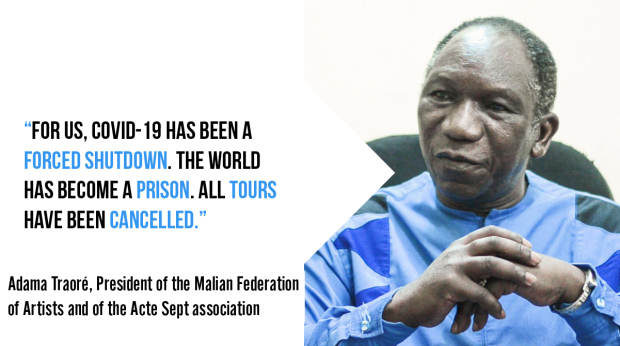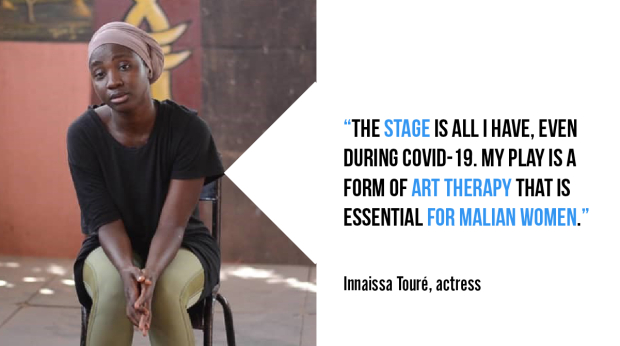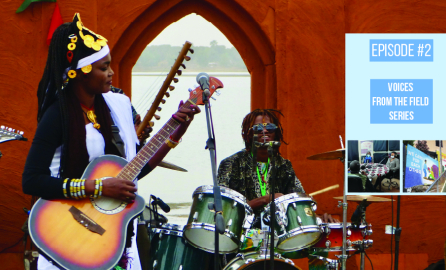This article was written by Dia Sacko, a communication strategy specialist and founder of Mali Culture Média Conseil.
This article is also available in French.
At a time when humanity has lost nearly one million people to COVID-19, one sector is holding its breath: culture. Cinemas, theatres, museums, opera houses and festivals remain closed. Artists, entertainment workers and industry professionals are caught between dismay and resilience while trying to create innovative solutions to prevent the complete disappearance of their industry. COVID-19 struck the world like a death knell, and no sector of Mali’s economy has been spared by the various measures imposed since the beginning of the pandemic.1
The curtain falls on culture due to COVID-19

After the great pandemics of the past, such as the Black Death, the world quickly moved on. But now this 21st-century plague has succeeded in restoring humanity to its original condition of fallibility. Our bustling world has turned into a prison.
Adama Traoré, President of the Malian Federation of Artists and of the Acte Sept association, reflects on his feelings about when the world's borders started to close: “COVID-19 made us think about ourselves and how we can project ourselves. It was as if the curtain was coming down and I found myself locked in a prison. All tours were cancelled. This brought us face to face with a fundamental question: How was this microscopic virus able to stop the world in its tracks?”
Economically, the cultural sector has been hit hard, with considerable losses of income that threaten the survival of many culture professionals. To learn more about the situation in Mali, we met representatives from various fields including theatre, dance, music, textiles, festivals and cultural support funds, all of whom painted a bleak picture of the harmful impact of COVID-19 on the cultural economy in Mali. While Ségou'Art, the Festival on the Niger, attracted 30,000 annual festival-goers in previous years, and its Craft and Agricultural Fair recorded around 250,000 visitors, COVID-19 has had a devastating impact on the local economy, both in human and in material terms.
Mamou Daffé discusses the impact of COVID-19 on the activities of the Korê Cultural Centre in Ségou: “COVID-19 has had a negative impact on the cultural sector, which has resulted in a considerable loss of income for artists and culture professionals in Mali. The Festival on the Niger Foundation, like other cultural organisations, has been hit hard by the public health crisis.”
Best practices in Mali's cultural sector
Despite the difficulties they face in sustaining their artistic activities, our experts from Mali shared how they have adapted their practices to cope with COVID-19:
- International and technical cooperation: Culture professionals keep going thanks to international support programmes, which have intensified their activities in the past three years with the creation of multiple funds dedicated to the cultural sector.
- Local solutions: Working with lesser-known artists and preserving the living memories of the elderly for the next generation.
- Performing artists: Adapting to the economic situation by working with a small number of artists to facilitate better conditions for them.
- Production and broadcasting via online channels: Virtual technology and events have become the norm, enabling culture professionals to continue their work while at the same time reaching a wider and more diverse audience around the world.
- SADA (social art digital approach): An approach by which activities are implemented with the help of digital tools.
- Digital e-learning platforms: Delivering capacity-building sessions for artists online.
- E-book and E-gallery platforms: Digitalising books and media resources to make them accessible to the public online, and facilitating the organisation of virtual contemporary art and museum exhibitions.
The resilience of Mali's COVID-19 heroes

Their names are Mamou Daffé, Adama Traoré, Fatoumata Bagayoko, Lamine Diarra, Mama Koné and Innaissa Touré. These Malian faces – brave combatants against the effects of COVID-19 – keep their sector going, their fists raised high. In Mali, where the various sectors of the cultural industry lack structure, the stakeholders have gone through a roller-coaster ride of emotions, with hope giving way to dismay. They continue their work with the help of international cooperation and technical assistance, which has intensified during the past three years thanks to the creation of various funds dedicated to the cultural sector. This includes the following funds and programmes: STAR2, Donko Ni Maaya3, the African Culture Fund4, Maaya, EU-United in Diversity5 and the ACP-EU Culture.
According to Jean-Luc Gbati Sonhaye, former administrator of the African Culture Fund, the first two components of the fund have financed 165 projects, including 120 projects led by artists and 45 by various organisations, across 40 African countries, with a total budget of €415,000. “Through several initiatives, the African Culture Fund (ACF) has stood by African artists and creators since the early days of the COVID-19 pandemic”, says Jean-Luc Gbati Sonhaye.
The difficulties experienced by Acte Sept have neither discouraged the association nor its president, and both continue to strive to make theatre accessible in Mali through the Festival de Théâtre des Réalités (Festival of Reality Theatre) in Sikasso. Resilience in the face of COVID-19 means the development of any solution that allows actors to continue their work during the shutdowns caused by the pandemic. For Acte Sept, this means adapting to the economic reality, as Adama Traoré explains: “We work with one or two performing artists to ensure that we are able to realise our productions in the right conditions, and to enable our artists to travel within Mali without great expense.”
Fatoumata Bagayoko, a professional dancer whose work has been heavily impacted by COVID-19, is keeping her spirits high despite the cancellation of the performances and exchange programmes she had planned for 2020 and 2021. She remains committed to her vocation by developing local solutions.
Another type of resilience is to take account of the disappearance of the living libraries of African culture. To ensure the transmission of culture, Acte Sept would like to capture the memories of the older generation so that these living libraries are not lost forever. “COVID-19 has brought us to the bitter realisation that all our great ones are disappearing”, says Adama Traoré. “We need to get them to share their knowledge in order to help us pass it on to the next generation.”
Innovative, tailor-made solutions

Mali's culture professionals take an interest in lesser-known artists and seek to bring them into the limelight to ensure that they are not overlooked in the various solutions to the crisis. For some, the unequal distribution of fame also translates into unequal treatment. In times of crisis, those artists who are better off will be able to benefit from their years of experience, but the inclusion of all culture professionals should remain a core principle of the proposed solutions. Moreover, as far as the artists are concerned, the media plays an essential role in this regard. Fatoumata Bakayoko firmly believes in this and encourages collaboration between the media and culture professionals: “If we don't have access to our audiences, we need to work with the media to reach them. We need to be able to demand fees that will allow us to live.”
Adama Traoré concurs with the Malian dancer, adding, “I hope that in the short to long term, there will be support for the introduction of a digital tax, to be paid by the operators, which the artists would then receive directly as royalties. Because this would be the tool that would allow us to work today.”
Mamou Daffé is thrilled by this brave world, characterised by interactivity and saved by digital technology: “Finally, thanks to the magic of digital technology, we have been able to reach a wider and more diversified audience than when our activities take place solely in person. This represents a huge opportunity for us, despite the current health crisis.”

In this context, the European Union is also mobilising to support West African culture professionals in their efforts to improve access to both digital and traditional cultural markets and to promote local artists internationally. This support is provided through the ACP-EU Culture Programme, which has awarded grants to the “Institut Français/Institut Kôrè du Mali” partnership, including a request to launch annual calls for proposals for the period from 2020 to 2024 in order to meet this objective.
In Mali specifically, the EU Delegation launched two project calls in 2020 and 2021 to support culture professionals, and it is continuing this support with an ongoing project that seeks to enable artists to identify and address governance and development challenges in Mali.
It is clear that a return to normal – and any attempt to fill cultural spaces with life again – will mean learning to live with COVID-19. This will require a rethinking of the economic models to ensure a better life together, with emphasis on cultural capital and heritage.
Click on the play button below to watch our video on how Malians are keeping culture alive during the COVID-19 pandemic.
Read the other episodes of the voices from the field series:
Credit: Video © Capacity4dev | Photo © Robert Dray
1 The Malian government has put in place new measures “to ensure compliance with the ban on gatherings of more than 50 people…to close all entertainment venues for the period from 10 to 25 April 2021…to suspend all festivities and other events for a period of 15 days from 9 April 2021…[and] to accelerate the acquisition of new vaccine doses and intensify the vaccination campaign”. (Source)
2 Star – Technical support for the arts: Protecting jobs in Mali's cultural sector contributes to the country's socio-economic stability and strengthens the role of art and culture as a driving force for social change. The aim is to enhance the entrepreneurial skills of artists, to support their activities and to lobby for the creation of a domestic market and a recognised status for culture professionals. The local partner is a Malian cultural development and production agency.
3 Donko ni Maaya – This GIZ programme is dedicated to crisis prevention and the strengthening of social cohesion through the promotion of the cultural sector in Mali.
4 The African Cultural Fund (ACF) provides funding for cultural projects in Africa.
5 United in Diversity has launched two project calls for 2020 and 2021 to support culture professionals in Mali.




Log in with your EU Login account to post or comment on the platform.